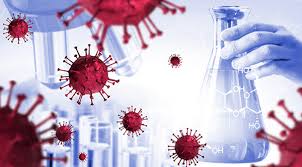COVID-19 Research: New Mutations T205I and D399N Evades Detection By PCR Tests. Fermented Yoghurt (Kefir) Can Prevent SARS-CoV-2 Cytokine Storms
Source: COVID-19 Research May 08, 2021 4 years, 8 months, 2 weeks, 6 days, 12 hours, 26 minutes ago
New Emerging T205I And D399N Mutations On Various Strains Of New Variants Evade Detection By Most Current COVID-19 PCR Tests
Researchers from University of Washington and the Fred Hutchinson Cancer Research Center-Seattle, have in a new study found that there are emerging mutations such as
T205I And D399N present in the nucleocapsid protein of new variants are helping the SARS-CoV-2 coronavirus escape detection by current COVID-19 PCR tests.

The study findings were published on a preprint server and are currently being peer reviewed.
https://www.medrxiv.org/content/10.1101/2021.05.05.21256527v1
Notifications were also sent to diagnostic manufacturers and labs around the world.
The SARS-CoV-2 viruses are now defined by a variety of rapidly evolving variant lineages.
Numerous U.S.FDA authorized molecular diagnostic tests have been impacted by viral variation, while no reports of viral variation affecting antigen test performance have occurred to date.
Alarmingly while determining the analytical sensitivity of the Quidel Sofia SARS Antigen FIA test (Sofia 2), the study team uncovered a high viral load specimen that repeatedly tested negative by this antigen test.
Whole genome sequencing of the specimen uncovered two mutations, T205I and D399N, present in the nucleocapsid protein of the isolate. All six SARS-CoV-2 positive clinical specimens available in their laboratory with a D399N nucleocapsid mutation and CT < 31 were not detected by the Sofia 2 but detected by the Abbott BinaxNOW COVID-19 Ag Card, while clinical specimens with the T205I mutation were detected by both assays.
Testing of recombinant SARS-CoV-2 nucleocapsid with these variants demonstrated an approximate 1000-fold loss in sensitivity for the Quidel Sofia SARS Antigen FIA test associated with the D399N mutation, while the BinaxNOW and Quidel Quickvue SARS Antigen tests were unaffected by the mutation.
The D399N nucleocapsid mutation has been relatively uncommon to date, appearing in only 0.02% of genomes worldwide at time of writing.
The study results demonstrate how routine pathogen genomics can be integrated into the clinical microbiology laboratory to investigate diagnostic edge cases, as well as the importance of profiling antigenic diversity outside of the spike protein for SARS-CoV-2 diagnostics.
Fermented Yogurt (Kefir) Can Halt Cytokine Storms Observed During SARS-COV-2 Infections
A new study by Israeli researchers from the Ben-Gurion University of the Negev (BGU) have identified molecules in kefir, a type of yogurt, that have the potential to combat pathogenic bacteria by blocking communication between cells. This approach also holds promise for fighting antibiotic-resistant bacteria and also helps in preventing cytokines storms that are caused by the SARS-CoV-2 coronavirus, according to Israeli media reports.
https://www.jpost.com/health-sci
ence/could-a-cup-of-yogurt-cure-your-case-of-covid-19-664976
https://www.israel21c.org/yogurt-as-a-cure-for-covid-19-and-crohns-disease/
The study findings were published in the journal: Microbiome
https://microbiomejournal.biomedcentral.com/articles/10.1186/s40168-021-01027-8
Kefir is a fermented probiotic dairy drink made by infusing cow or goat milk with kefir grains containing yeast and lactic acid bacteria. Probiotics are widely perceived as helping immune functions, affecting balanced microbial populations in the digestive system, and potentially protecting the body against bacterial infections.
Dr Doug Seserman, chief executive officer, American Associates, Ben-Gurion University of the Negev told Thailand Medical News, "The healthy properties of probiotics in yogurt have been widely recognized, but our remarkable BGU researchers have shown how they actually have the potential to be highly effective drugs. It is another example of groundbreaking research and innovation at BGU."
The study team demonstrated that the kefir-secreted molecules were able to significantly reduce virulence of Vibrio cholerae - which causes cholera. The anti-bacterial effect was based on disrupting communication among the bacterial cells which is a promising approach against antibiotic-resistant bacteria.
Interestingly in a follow-up study, the scientists observed that the isolated molecules had dramatic anti-inflammatory properties in various pathological conditions and disease models. For example, experimental results revealed that the molecules effectively healed mice inflicted with a lethal "cytokine storm" - the extreme immune response which is one of the main causes of death in COVID-19 patients.
These molecules not only eliminated the cytokine storm, but also restored balance to the immune system, an extraordinary feat pointing to significant therapeutic potential.
The study team have formed a new company to develop and commercialize the technology through BGN Technologies, the BGU technology transfer company.
Dr Josh Peleg, CEO of BGN Technologies added, "In a world where antibiotic-resistant bacteria are becoming an imminent threat, the novel molecules discovered by BGU scientists pave a completely new path for fighting bacterial infections by disrupting cell-cell communications in pathogenic bacteria. Moreover, the dramatic anti-inflammatory activities of the molecules may open new avenues for therapeutics and scientifically proven probiotic food products. Years of breakthrough research have now reached a validation point that led to the establishment of a biopharma company for the further development and clinical evaluation of this exciting new technology that can potentially revolutionize the treatment of bacterial infections as well as inflammatory conditions."
For the latest
COVID-19 Research, keep on logging to Thailand Medical News.
Please help support this site by making a donation. Thank You.
https://www.thailandmedical.news/p/sponsorship
